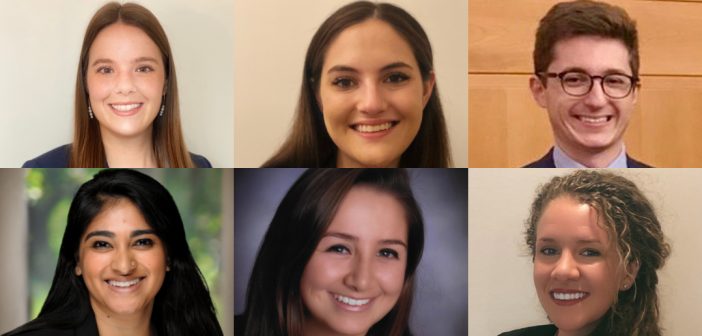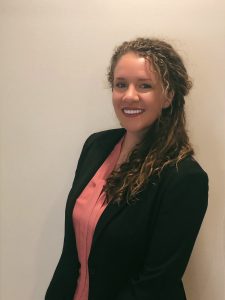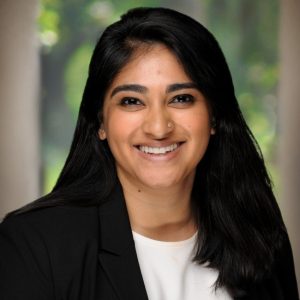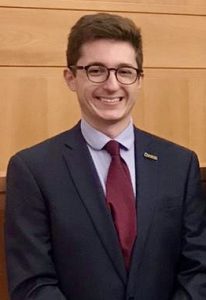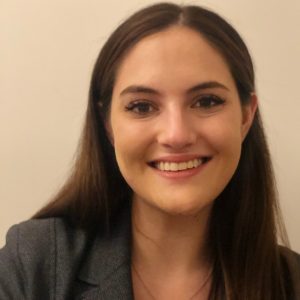The Center for Judicial Events & Clerkships, to further the clerkship side of the Center’s mandate, has launched a Peer Clerkship Council (PCC). The founding members of the PCC are members of the J.D. Class of 2021 who have worked closely with the CJEC to secure their clerkships with state and federal court judges. In the true spirit of Fordham Law, these students will now “pay it forward” by providing guidance and support to their fellow students who seek to pursue clerkships.
The PCC will play a key role in helping the CJEC to foster a broad and inclusive clerkship-oriented culture through:
- Directly engaging with students, including 1Ls, by hosting weekly office hours
- Developing peer-to-peer clerkship programming and resources including workshops on building relationships with faculty and asking for letters of recommendation
- Building bridges among our alumni clerks, current students who’ve secured clerkships, and prospective clerkship applicants.
Throughout its inaugural year, the CJEC benefited enormously from its cohort of judges and alumni clerks.
“As the CJEC embarks on its second year it is a natural next step to involve current students in our endeavors and to provide student leadership opportunities,” said Assistant Dean Suzanne M. Endrizzi ’96. “The enthusiasm, energy and desire of this inaugural PCC is truly representative of Fordham Law’s motto ‘In the service of others.’ We know that the CJEC and the Law School will be richer for their involvement.”
Echoing that sentiment, Professor Daniel J. Capra, faculty director of the CJEC, said, “Developing a clerkship-oriented law school culture can only truly be achieved through student involvement.”
Meet the Members of the Peer Clerkship Council
Alexandrea Jacinto ’21
Hometown: Middletown, New Jersey
Education: B.A. in Government and Law, minor in History, Lafayette College
Clerkship: Judge Clarkson Fisher, State of New Jersey Superior Court, Appellate Division, August 2021-2022 term
“I am a member of the Intellectual Property, Media and Entertainment Law Journal Board as a Notes and Article Editor. I am also a member of the Brendan Moore Trial Advocacy Team.“
“I chose to clerk after graduation because of the valued experience you can only receive when clerking for a judge. Anyone I’ve ever spoken to only talks about the value and unique experience they gained from their respective clerkships, no matter the state or court for which they clerked.”
“I chose to be a part of the Peer Clerkship Council because I want to be a lifeline for my fellow law students who are interested in Clerkships post-graduation. The idea of applying can be daunting and having someone to reach out to who has just been through the application process is someone I wish I had access to last year.”
Saniya Suri ’21
Hometown: Mclean, Virginia (D.C. suburb)
Education: A.B. in Anthropology and minor in Legal Studies, Washington University in St. Louis ’17
Clerkship: Judge Cathy Seibel, United States District Court for the Southern District of New York, February 2022–August 2023 term
“I came to law school because I am interested in working on issues at the intersection of the health industry and the legal system. Before coming to Fordham, I worked as a paralegal for a mid-sized firm in Northern Virginia that specialized in medical malpractice and health law. During my 1L summer, I worked at New York Legal Assistance Group (NYLAG) in their Legal Health Unit. I also was a research assistant for Professor Robin Lenhardt. In addition, I was in the International Human Right Clinic with Professor Chi Mgbako and also externed for the U.S. Attorney’s Office in the Eastern District of New York in the Civil Division. Outside of law school, I love exploring the city with my sister (my new roommate) and dishing up new recipes. I also love music, singing, and dancing, along with reality tv!”
“I am a Stein Scholar, was a bench team member for Moot Court, was the Co-Chair of the South Asian Law Students Association (SALSA), and am the Editor-in-Chief for the Fordham Law Review.”
“I am interested in working in litigation and eventually government service and believe clerking will provide me with a unique set of skills and perspectives to succeed in these positions. I am so interested in understanding how judges approach legal issues and solve difficult problems. This insight will allow me to approach legal issues from a more nuanced and critical lens.”
“Between not having lawyers in my family and being really passionate about getting a clerkship, I often had many questions throughout the clerkship process and yearned to hear advice from peers/recent alumni. When asked to join the PCC, I saw this as an opportunity to give back and serve in this position for others.”
Zach Huffman ’21
Hometown: Fairfield, Connecticut
Education: M.A. in International Relations, The University of Chicago ’15; B.A. in Politics, Princeton University ’14
Clerkship: The Honorable Claire C. Cecchi, United States District Judge for the District of New Jersey, August 2021-2022 term; The Honorable Joseph Bianco, United States Court of Appeals for the Second Circuit, Fall 2024-2025 term
“I am the Executive Articles Editor of the Fordham Law Review as well as a member of and former interschool competitor for the Fordham Moot Court Board. I am a research assistant to Professor Courtney Cox and previously served as a BSA advisor for House 1.“
“I chose to clerk to have the opportunity to work in an intense research and writing environment, where I’ll grapple with difficult and often novel legal issues every day. I also look forward to the mentorship in chambers from the Judge and her wider network of clerks that is so often an essential part of a clerkship. Finally, with long term aspirations to potentially work in government and practice appellate law, two career paths that often view a clerkship as an employment prerequisite, clerking will open doors to numerous professional opportunities.”
“I am excited and honored to be an inaugural student member of the PCC. The CJEC has been an invaluable resource during my clerkship search, and I firmly believe that all Fordham students should engage with the center, even if they are just remotely considering a clerkship or interested in the judiciary. By joining the PCC, I hope to interact with students to foster general enthusiasm for Fordham’s clerkship program and events, help dispel some of the myths associated with the application process, and serve as a general resource to students curious about pursuing a clerkship.”
Kendra Kumor ’21
Hometown: Toledo, Ohio
Education: B.A. in Communication and Political Science, Boston College ’16
Clerkship: Judge Paul Kelly, United States Court of Appeals for the 10th Circuit, 2021-2022 term; Judge Vincent Briccetti, United States District Court for the Southern District of New York, 2023-2024.
“This year I will be an Articles & Notes Editor for the Fordham Law Review. I will also be the Environmental Law Editor for Fordham Moot Court, and last year I was a Jessup International Law Moot Court competitor.“
“I first became interested in pursuing a clerkship because I had two fantastic experiences in chambers. Additionally, upon looking at my professors’ resumes and the resumes of other alumni and attorneys that I look up to, a common theme was that each had completed at least one clerkship. This really convinced me a clerkship provides a solid foundation for any career path. Moreover, when asked about their clerkships, professors and alumni emphasized the lifelong mentorship they’ve received from their judges, which is something I am looking for as a young attorney.”
“As an inaugural member of the PCC, I really want to demystify the clerkship application process and make it less intimidating for every interested student. Before the CJEC, the student body didn’t necessarily have one unified place to go for information about clerkships. Now that we have such a great resource, I want to make sure it’s easily accessible to students and becomes part of the student community at Fordham.”
Corey Matthews ’21
Hometown: Scarsdale, New York
Education: B.A. in Government with minors in Law & Society and Science & Technology Studies, Cornell University College of Arts and Sciences (’16)
Clerkship: Judge Vincent Briccetti, United States District Court for the Southern District of New York, 2023-2024 term
“In addition to the Peer Clerkship Council, I am the Managing Editor of Volume 89 of the Fordham Law Review and a member of the Fordham Law Moot Court Board. As a 2L I competed on the Pepperdine Entertainment Law team for Moot Court and also served as a 1L advisor for the Fordham Law Board of Student Advisors.“
“I had heard throughout my first year at Fordham that clerking was valuable for students interested in litigation, so I was curious about the clerkship experience early on. However, I had the opportunity to really get a view into chambers during my first summer as a judicial intern.” I was blown away by the extent to which the judge relied on his clerks and really involved them in thinking and writing about complex and important legal issues. I found the environment and work in a judge’s chambers to be interesting, exciting, and stimulating. I saw clearly that my own writing and analytical skills grew leaps and bounds in that short period of time. These impressions were confirmed during a judicial externship I completed in my 2L year, in which I had a similarly wonderful experience. My time in chambers also opened my eyes to the ways that clerking could open doors for me later in my career.”
“I have always been so impressed with the way that members of the Fordham community look out for one another. The clerkship application process was no exception—I received so much help, support, and guidance at every step. I feel that I owe a lot to my peers and the professors and faculty that have helped me along the way, so I am excited to be able to pay it forward. I also think the topic of clerkships creates a lot of anxiety and apprehension for students (as it did for me) and I want other students to know that the clerkship application process is not a black box. There are a lot of myths and misconceptions and I hope that hearing about the experiences of a peer helps to dispel them.”
Caroline Schulte ’21
Hometown: New York, New York
Education: B.A. in Political Science and Spanish, Bucknell University ’16
Clerkship: Judge Peter A. Bogaard, Superior Court of New Jersey – Morris County – Civil Division, 2021-2022 term
“I am serving as a notes and articles editor of the Fordham Intellectual Property, Media & Entertainment Law Journal and as student coordinator of the Uncontested Divorce Project through Sanctuary for Families.“
“I chose to clerk because I wanted to hone my research and legal writing skills, as well as gain exposure to a myriad of different civil litigation practice areas. One of the best ways to learn about practicing law is by reading others’ writing and watching attorneys. As a clerk, I look forward to reading parties’ moving papers, hearing discovery disputes, and watching oral arguments. I am also interested in fostering a mentorship relationship with my judge, who practiced for decades before sitting on the bench. I am excited to learn all that he has to offer and soak in his knowledge.”
“I am excited to be part of the PCC this year because I want to demonstrate to students that clerkships are accessible to all members of the law school student body. There are a lot of myths surrounding the clerkship application process and the exercise can feel quite daunting. The CJEC is a wonderful resource and I hope to bridge the gap between students and administrators to help foster excitement about clerkship opportunities and a better understanding of the state clerkships that are available. There are so many pathways students can take after clerking, from private practice to public interest and social justice or government work. I relish the opportunity to be a resource for other students and to act as a sounding board for them. No question is too small or too basic!”

